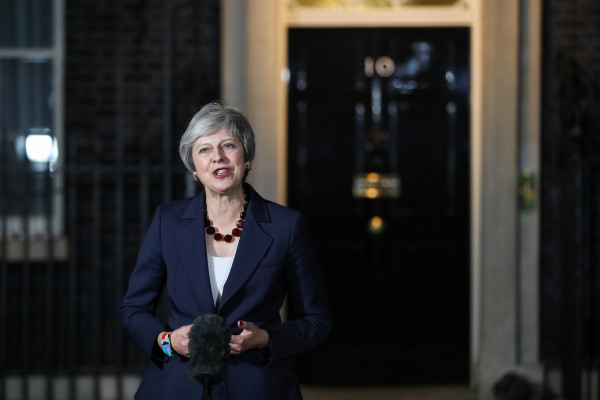

That’s one of many unanswered €64,000 questions that dominate the political agenda as it stands right now.
The current political infrastructure, however, seems not to be ‘standing’ but quivering on its last working leg.
This is the backdrop advisers are working in, during a period in which they are not sure if the Prime Minister Theresa May, or much of the Cabinet, will still be in their jobs by the time they wake up.
But a more optimistic slant on this is the comparatively calm, patient and pragmatic view prevalent across many advisers and fund managers - even in a calamitous few months for the government.
So in that context, where can advisers ascertain more reliable information about prospects for 2019, and how to provide assurance for clients? The simple truth is their fellow advisers and established entities.
The Bank of England’s most recent analysis of Brexit’s economic impact is one of the more credible sources for a 2019 outlook – notwithstanding the nature of attacks from euro sceptics on its release in late November.
Critics of this assessment tended to focus on political aspects, rather than how its calculations were made, accusing governor Mark Carney of engaging in “Project Hysteria” and politicising the central bank.
The analysis, however, outlines the effects in a worst case scenario post-Brexit, which is, after all, the governor’s job – along with ensuring monetary policy can help the economy withstand such a scenario.
The analysis, which focused on extremes (as is the case with banks’ stress tests), suggested the following in the event of a disorderly withdrawal:
- The economy could be a 10th smaller in five years;
- The economy could shrink 8 per cent if there is no transition period;
- House prices could fall by a third.
A lot of supposition underpins this analysis and the problem is, the extremities gave ammunition to the governor’s critics.
America first
On a more geopolitical front, Keith Wade, chief economist and strategist at Schroders, outlines how the US-China trade war (which appears to be cooling), as well as US economic policy, could shape the global outlook for investors.
He forecasts a more “stagflationary environment” in 2019 with global growth set to slow and inflation set to rise.
While he expects US interest rates to peak at 3 per cent in mid-2019, as other central banks tighten monetary policy, Mr Wade adds: “The US dollar looks set to weaken, which could benefit emerging market assets.”
Although he expects the difference between America’s interest rates and those elsewhere will favour the US, Mr Wade believes currency markets “are likely to have priced this in already”.
Safety in diversity
So in such volatile times, are advisers observing a groundswell of concern? Hardly.
Scott Gallacher, a director and chartered financial planner at Rowley Turton, says: “We have received a couple of emails [about Brexit], but these represent about 2 or 3 per cent of our client base.”
He notes: “Volatility is always there, in some shape or form. Some of us are old enough to have seen and experienced the impact of global events while managing clients. I recall the effects of the September 11 attacks and the aftermath.
“There’s always a reason to be fearful, and some asset classes may be affected more than others. The key is to ensure clients have a well balanced, diversified portfolio of investments to the extent they’re not over exposed to one area.”
Mr Gallacher adds that there’s a wider political aspect to this: “About 52 per cent of the public got what they wanted when they voted in the referendum, so maybe there’s less reason to panic among clients within that group?
"It may not be as clear cut as that, but we’re taking a pragmatic view; it seems clients are doing the same.”
He also observes that, like others, he has seen an impact of the current political/economic outlook on UK domestic stocks but believes a lot of the potential issues are already priced in.
“Some (shares) don’t appear to have too much further to fall in value, and should start to recover,” he adds.
Philip Hanley, director and independent financial adviser at Philip James Financial Services, is similarly sanguine.
“If clients are invested in an actively managed portfolio, with a spread of market and asset class exposure, I don't have any long-term concerns,” he explains.
“I said the same in 2000. However, 9/11 happened, then we invaded Iraq, and it was four years before the graph headed up again. So, always expect the unexpected.”
While clients’ headline concern is Brexit, Mr Hanley says he assures them that “managers have already taken action to reduce weightings in the UK and, of course, that it may never happen”.
Words of wisdom
Alan Chan, director at IFS Wealth & Pensions, suggests: “Some clients may not have experienced such volatility, but we try to coach them from the start to think long term and to block out all the short-term noise.
"Volatility will have the greatest effects on drawdown clients, so we’d be closely reviewing their income strategies.”
If clients do get spooked by bleak forecasts in the press, perhaps advisers could remind them that volatility is part and parcel of long-term investing.
They could also divert them to this old quote, from Danish, Nobel prize-winning physician Niels Bohr: “Prediction is very difficult, especially if it’s about the future.”
Marcel Le Gouais is a freelance journalist



